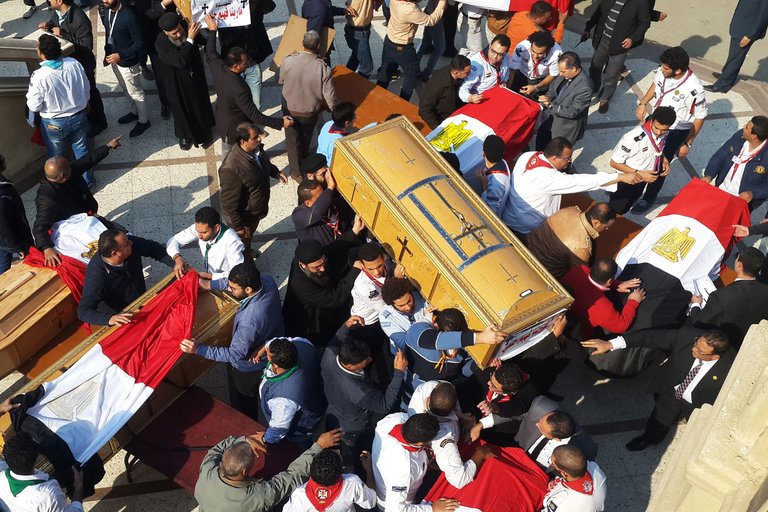ISIS Claims Responsibility for Egypt Church Bombing and Warns of More to Come

Egypt faced the prospect of a surge in sectarian bloodshed on Tuesday after the Islamic State claimed responsibility for the bombing of a Coptic cathedral in Cairo that killed 25 people on Sunday. The group warned of more attacks to come.
As Christians gathered in churches to pay their respects to the victims, most of them women, the Islamic State said it had sent a suicide bomber to the chapel on the grounds of St. Mark’s Coptic Orthodox Cathedral, the seat of the Egyptian Orthodox Church.
The Islamic State, also known as ISIS or ISIL, identified the bomber by his nom de guerre, Abu Abdallah al-Masri. The Egyptian authorities on Monday identified the attacker as Mahmoud Shafik Mohamed Mostafa, but said he had used a different alias. There was no immediate explanation for the discrepancy.
A surveillance video made public by the Egyptian authorities showed a figure, said to be Mr. Mostafa, as he entered the church, followed moments later by a blast. It was the deadliest militant attack on Egyptian civilians in years, and the country’s worst act of sectarian violence since another Islamist group bombed a Coptic church in Alexandria in 2011.
The Islamic State vowed to escalate its “war on polytheism” — a phrase that, in the Egyptian context, is a thinly veiled reference to Christianity. The threat suggested that the group, which has been battling the Egyptian military in the Sinai Peninsula for years, planned to intensify its operations in Egypt’s biggest cities.
It was an embrace of sectarian violence on a scale rarely seen before in Egypt, with the Islamic State suggesting that it was prepared to single out Egyptian Christians much as it did minority Shiites in countries like Iraq and Syria.
All of that poses a new challenge for President Abdel Fattah el-Sisi, who is already grappling with an economic crisis that has caused widespread discomfort and a slump in his popularity.
Until now, Mr. Sisi has tended to reflexively attribute most violent attacks to his enemies in the Muslim Brotherhood, the Islamist political movement whose leader, Mohamed Morsi, was ousted by the military in 2013. On Monday, the Interior Ministry said that exiled Brotherhood leaders had provided “financial and logistical support” for the church bombing.
But the Islamic State’s statement appeared to pour cold water on that assertion. Militancy experts said it was unlikely that the Brotherhood would have financed an Islamic State operation, although there is broad agreement that the man accused in the bombing, Mr. Mostafa, was arrested at a Muslim Brotherhood protest in 2014.
Mr. Mostafa’s family said he was jailed and released some time later, when they lost contact with him. His lawyer said he had been tortured in jail, which may have led to his radicalization.
On Tuesday, images of grief-stricken parents clutching the coffins of their children were circulated on social media. The pictures provoked an outpouring of sympathy, but also a renewed wave of fury directed at Mr. Sisi for his government’s failure to secure the cathedral.
Egyptian Copts, who are about 10 percent of the population, have long complained of systematic discrimination. But Mr. Sisi’s government, in keeping with its usual reaction to major crises this year, chose instead to turn its focus on its foreign critics.
In a statement, the Ministry of Foreign Affairs denounced Amnesty International and Human Rights Watch for statements issued after Sunday’s bombing, criticizing Egypt’s record in protecting minority Christians.
A ministry spokesman, Ahmed Abu Zeid, said the human rights groups had shown an “unacceptable tolerance to terrorism.”
If the Islamic State does escalate its attacks against civilians, Mr. Sisi faces some tough choices. He could come under pressure to take more punitive measures, like executing more of the prisoners on death row, said Mokhtar Awad, a research fellow at the Program on Extremism at George Washington University.
But faced with an increased threat from a foe like the Islamic State, Mr. Sisi should take a new approach to counterterrorism policy that is “more nimble and nuanced, focused on intelligence and how to stem the tide of radicalization in the country,” Mr. Awad said. “This is the challenge for Egypt.”